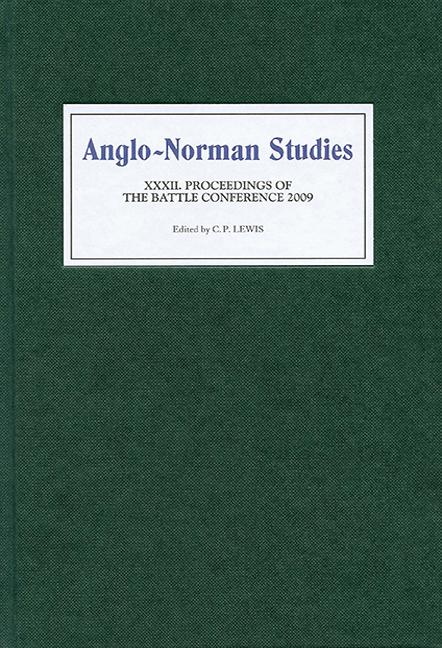Book contents
- Frontmatter
- Contents
- List of Maps and Tables
- Editor's Preface
- Abbreviations
- The Peace of God and Bishops at War in the Gallic Lands from the Late Tenth to the Early Twelfth Century
- Ad erudiendum tradidit: The Upbringing of Angevin Comital Children
- Coming and Going: The Use of Outdoor Space in Norman and Anglo-Norman Chronicles
- The Urban Transformation in England, 900–1100
- The Taming of the Laity: Writing Waltheof and Rebellion in the Twelfth Century
- Close Relations? Some Examples of Trade Links between England and the Towns and Ports of Lower Normandy in the Thirteenth and Early Fourteenth Centuries
- The Roots of the English Royal Forest
- Knighthood and Chivalry in the Histories of the Norman Dukes: Dudo and Benoît
- Prayers for the King and Royal Titles in Anglo-Norman Charters
- Domesday Mortlake
- Miscellaneous Endmatter
The Urban Transformation in England, 900–1100
Published online by Cambridge University Press: 28 April 2017
- Frontmatter
- Contents
- List of Maps and Tables
- Editor's Preface
- Abbreviations
- The Peace of God and Bishops at War in the Gallic Lands from the Late Tenth to the Early Twelfth Century
- Ad erudiendum tradidit: The Upbringing of Angevin Comital Children
- Coming and Going: The Use of Outdoor Space in Norman and Anglo-Norman Chronicles
- The Urban Transformation in England, 900–1100
- The Taming of the Laity: Writing Waltheof and Rebellion in the Twelfth Century
- Close Relations? Some Examples of Trade Links between England and the Towns and Ports of Lower Normandy in the Thirteenth and Early Fourteenth Centuries
- The Roots of the English Royal Forest
- Knighthood and Chivalry in the Histories of the Norman Dukes: Dudo and Benoît
- Prayers for the King and Royal Titles in Anglo-Norman Charters
- Domesday Mortlake
- Miscellaneous Endmatter
Summary
All this is undoubtedly hypothetical, but it suggests itself from circumstantial evidence to the Antiquary, and is therefore mentioned, whatever credit may be due to it.
Thomas Fosbrooke, An Original History of the City of Gloucester, London 1819, 343Marc Bloch warned historians against l'idole des origines – ‘the idol of origins’, the interpretation of an historical situation by reference to its origins, however distant, while neglecting the effect of contemporary factors. At its most extreme, this can lead us to treat ‘origins’ not only as a beginning that explains but even as a complete explanation. An illustration could well be ‘the origins of towns’, a traditional area of research which has too often seen an assumption that it is the circumstances of a town's ‘beginnings’ that need to be explained rather than its subsequent success as a commercial settlement, almost as if the later centuries of growth and development were implicit in the initial act. This approach has laid greater emphasis on perceived antecedents of urbanization rather than on the factors favourable to the town's survival and growth: so that the circumstances of how an urban community established itself – or was established – as a suburb outside a castle or an ancient ecclesiastical city, or at a route centre favourable to periodic marketing, or at an ancient church site, or within a fortress planned by a king, is by implication held to account for the much wider urbanization of a region or of a society.
In stressing that the process of urbanization in England – as elsewhere – is much more interesting than that, it is not intended to diminish the importance of early phases in the growth of towns. The circumstances of a town's origins doubtless influenced aspects of the form and course that urbanization would take, and it was a town's early phases that shaped and influenced its physical form. But it is necessary to see beyond questions of specific origins which tend to obscure the more fundamental questions about the wider process of urbanization, and the reasons for it. That was a development that is only to be understood within the context of far-reaching contemporary changes, the processes of economic development and change (and we might say economic and social transformation) that brought about the fundamental division between countryside and town.
- Type
- Chapter
- Information
- Anglo-Norman Studies XXXIIProceedings of the Battle Conference 2009, pp. 57 - 78Publisher: Boydell & BrewerPrint publication year: 2010

